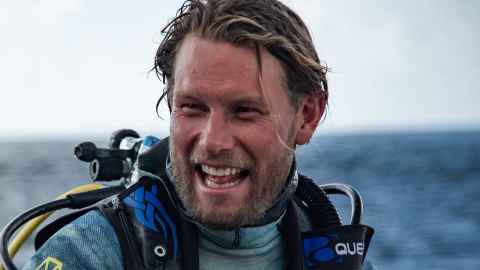Dr Riley Elliott
Dr Riley Elliott is a shark scientist, adventurer and TV host. He’s known as the Shark Man and has dedicated over a decade of academic research to the conservation of sharks, alongside dozens of TV documentaries and media appearances, with the overarching goal of saving sharks from possible extinction. He has also helped to change government legislation to protect New Zealand’s shark species.
Dr Riley Elliott is to sharks as Steve Irwin is to crocodiles, although Riley has the added benefit of holding a Bachelor of Science (Honours) degree in zoology, a Master of Science and a PhD in Marine Science.
Using a combination of science and showmanship, Riley uses popular platforms to educate the public about sharks and, ultimately, save the misunderstood creatures from a rapid decline in numbers.
“The mission is to share the ecological importance of sharks any way that I can,” says Riley, who grew up in Hamilton and now lives in Tairua on the Coromandel Peninsula.
His breakthrough came when he co-produced the ten-part series Shark Man – an action-filled documentary series that followed Riley as he worked with shark researchers, divers, fishermen, and, of course, sharks. It was released in New Zealand in 2014 and is currently streaming on Amazon globally.
That opened the floodgates to more media work, giving greater exposure to shark science and earning Riley the moniker “Shark Man”.
He has since produced and presented over a dozen documentaries for Shark Week, the BBC and National Geographic. Most recently he created the first ever reality TV show for the Discovery Channel called Shark Academy, pitting eight contestants against each other in a series of shark research challenges to secure a coveted spot on Riley’s next scientific expedition.
He says science has become business, and producing TV shows is one of the most powerful tools to communicate science to a mass audience – Shark Week reaches an audience of over 30 million people annually.
By using the power of mass media, Riley is able to project his message to a far greater audience than relying solely on publishing scientific papers – although he acknowledges the necessity of publication too.
“The ability to do research for purely interest’s sake has been the foundation of knowledge, but it’s becoming harder to execute.
“It’s hard to get funding for shark research, and there’s so much we don’t understand about these creatures. The public and the Discovery Channel have been incredible at funding such work.”

Riley’s PhD, completed at the University of Auckland, was funded non-conventionally, largely by the public and his TV work. His field-based (or rather ocean-based) research at the University’s Leigh Marine Laboratory was not cheap due to the specialist equipment needed.
And while he may have come face-to-face with great white sharks, doing a PhD, he says, was one of his toughest challenges.
“Finishing a PhD is one of the hardest occupational feats around. The combination of the age we do it and the necessity of money at that time in your life make it so hard. But the desire to become an expert in your academic field, to push boundaries for the betterment of that niche, reflect what university should be all about.”
Most recently Riley established the Great White Project, which involved satellite tagging a new and growing population of juvenile great white sharks in the Bay of Plenty region.
Data from the public-sponsored satellite tags is displayed free to the public on a tracking app, and has helped Riley publish groundbreaking new information about pupping habitats.
“A longer-term goal is to set up a university field course where I can empower young researchers with the skills required to work with potentially dangerous yet critical species, like sharks.”